Black smoke. Armored vehicles. Pepper spray. 300 helmeted police in riot gear. Helicopters. Nightsticks. Snipers. Bean bags. Rubber bullets. Sound cannons. Cell phone jamming.
Drums. Sage. Prayers. 300 unarmed peaceful water protectors. Tobacco. Tribal elders. Song. Blockade.
Crossing Minnesota, I don’t yet realize what I am driving into. The land is brushed with a thousand shades of khaki and rust. A mist of rain drops from a low scudding sky, and the edge of winter stands ready. Hawks sit on fence posts, feathers puffed against the rain and cold. I am headed back to Standing Rock and Sacred Stone Spirit Camp. I am pushing against the demands of regular life, which pulls me backwards like a magnet. I’ve come to the conclusion that there is no convenient time in life to do the right thing.
Last weekend, over 127 water protectors were arrested. Their numbers depleted, I may be arriving only to be fodder. With construction proceeding on the pipeline, the Nations have set up a camp directly on the pipeline route, claiming eminent domain and reclaiming land seized from the Treaty of 1851.
Conflict, like winter, is in the air. But this is not about me. It may seem like it, but there are much bigger things at stake.
When I reach camp, I wander down to the sacred fire. The ratio of Lakota to whites has reversed, now there is one native present for every two whites. Numbers are down. The weather is changing. People have other lives. It seems to me that we are on a trend.
Sitting around the fire, I go on my own private mental rant. Something is out of balance with our world. We sit in our houses drugged by our TVs and possessions. We text each other rather than talking. Billionaires can buy elections and no one is responsible for anything. There is no justice for those who live on reservations or poorer communities. They can not escape the pollution that seems a product of our consuming lifestyles. The power structure is out of whack. I assure myself that I am turning into a curmudgeon.
That night I sleep for the first time in a tipi. It is cold but somehow comforting. The air is clean. The lodge poles fresh cut in the Apsáalooke (Crow) tradition of needle bows on the tips. I am out like a bear in winter in my bag under heavy blankets.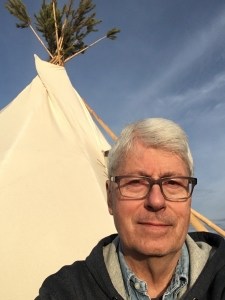
I awake refreshed after a long winter. Sound travels faster in cold air, and the geese flying up the river valley sound like they are a few feet away. I’ve always like this sound. The honking. The sound of wings.
At morning prayer, I sense tension. Someone wants a new rule. Others say there are too many rules. But I just hear noise.
I leave to see if my friend, Oyuputa, has stopped by as he promised. After waiting for an hour I decide to go to Oceti Sakowin camp and see what is happening. I spend some time thinking about what I will bring. I leave everything except my driver’s license. Even that seems like excess. When you strip life down, and get rid of passports, borders, politicians, rules, and religions aren’t we all just Earth Walkers? It seems that all of this baggage divides rather than unites us.
The camp is sparse. I go to the legal aid tent to fill out an information form but am told they are in a meeting. At 11:30, word begins to spread that people are needed near the front line so I hitch a ride there in an ancient pickup to see what is happening.
There are 14 tipis camped along the pipeline ditch and a trailer parked inside the fence. There are the makings of a kitchen and supply area. The day is warming, the grass is yellow, and the horizon is 1,000 miles away. A torn swath slithers up the eastern side where the pipeline wants to go, the “black snake” as native prophecy predicts the end of the world. I don’t know if that is true, but we are poisoning the atmosphere. Over a million tons of pollution per week will be produced by the pipeline. I am reminded by the buffalo nearby that they don’t crap where they eat. Can we endlessly pump carbon into the air we breathe? Why does Enbridge get to determine the fate of the earth? Nature is impartial. It doesn’t care. It will simply turn our land into deserts.
The land on which the camp is pitched has been purchased by DAPL. The camp seems too little too late, and hard to defend. Soon a dozen patrol cars appear on the ridge to the west where construction is taking place. I will recall this as the beginning of a slow motion dream.
A prayer circle begins in the road. In its center are five or six elders. The youngest must be seventy-five. One in a wheelchair. They are singing and praying.
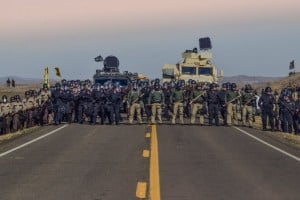 The front blockade is half a mile north on the road. People are called to go to the front line blockade, but before I can go ten steps, I am told to go back to help protect the prayer circle of elders. Two armored vehicles appear in front of the barricade to the north. Then troopers appear to the west and on each side of the road. Hundreds of them. Helicopters begin to circle. All this happens painfully slow. I wonder what I can do to protect those in the circle?
The front blockade is half a mile north on the road. People are called to go to the front line blockade, but before I can go ten steps, I am told to go back to help protect the prayer circle of elders. Two armored vehicles appear in front of the barricade to the north. Then troopers appear to the west and on each side of the road. Hundreds of them. Helicopters begin to circle. All this happens painfully slow. I wonder what I can do to protect those in the circle?
Then smoke. Black smoke. The hay and tires of the barricade appear to be burning. It’s a bad sign. We watch and wait, unable to tell what is happening from a distance. Over the next two hours, the armored vehicles will plow through the barrier and a line of at least 300 troopers dressed in riot gear begin to push the water protectors back a foot at a time. There are various skirmishes to the west and two more armored vehicles appear from the east. And the black line of troopers keeps coming.
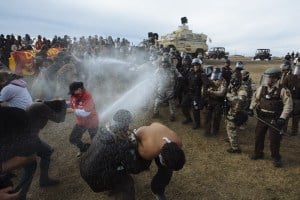 I am afraid. Afraid for the possibility of stupid acts by either the troopers or the crowd. Afraid that I might be Maced or shot. But fear is a funny thing. Slowly I am not afraid for myself, but for others. Afraid for those who cannot run. I see a young woman who is beside herself. I walk up to her and tell her she is going to be OK. I hand her a small polished stone from Lake Superior and tell her that water shaped this stone. Please hold it for me. It will give you strength.
I am afraid. Afraid for the possibility of stupid acts by either the troopers or the crowd. Afraid that I might be Maced or shot. But fear is a funny thing. Slowly I am not afraid for myself, but for others. Afraid for those who cannot run. I see a young woman who is beside herself. I walk up to her and tell her she is going to be OK. I hand her a small polished stone from Lake Superior and tell her that water shaped this stone. Please hold it for me. It will give you strength.
People now know what’s going to happen. I see the first person get pepper sprayed. They are carrying huge canisters that spray 30 feet. The first arrests take place and the troopers advance. I turn and I am separated from the young woman. The troopers advance again, foot by foot. A tipi is erected in the roadway. I have ear plugs in to protect me from the sound blasters. The police bull horns are saying something. I see a person being thrown to the ground violently. I see no alternative. I look over at Chief Arvol Looking Horse in the circle. I see an ancient old man in a Cheyenne headdress. We lock eyes for a moment. It’s an acknowledgement. Enough to tell me we are now together, and the people in the circle are not moving. I can’t do anything to really protect them. Enough is enough. You may call me naïve. When we have justice only for some, we have justice for none. This whole incident looks calculated by our militarized police. Provoke a reaction, justify the force.
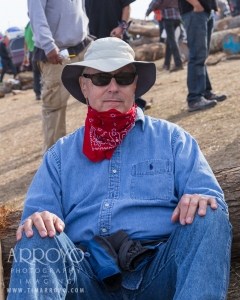 I walk forward 10 feet and sit next to the ditch. I have no good reasoning for this except that if it takes two officers to arrest me, it diminishes their numbers and maybe provides more time for others. I expect to get pepper sprayed or worse. I try to pray. I’m not very good at praying, so I start reciting the names of my grandchildren: Ian, Eva, Teo, Mino, Sol. I say their names over and over and I am connected. My eyes are closed, and I am yanked to my feet by two officers. They have surged from the line, still twenty yards away, and picked me out.
I walk forward 10 feet and sit next to the ditch. I have no good reasoning for this except that if it takes two officers to arrest me, it diminishes their numbers and maybe provides more time for others. I expect to get pepper sprayed or worse. I try to pray. I’m not very good at praying, so I start reciting the names of my grandchildren: Ian, Eva, Teo, Mino, Sol. I say their names over and over and I am connected. My eyes are closed, and I am yanked to my feet by two officers. They have surged from the line, still twenty yards away, and picked me out.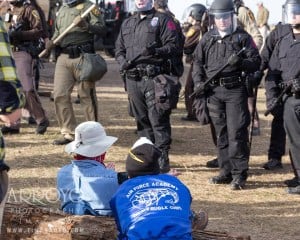
They drag me backward up the roadside ditch and stand me up along the fence. I am zip tied and searched, marched 200 yards to a white van where I am photographed and given a Sharpie tattoo with an arrest number. I am now number 112. The 12th person arrested.
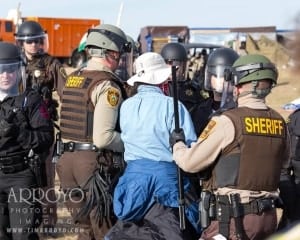 While standing on the ridge, I hear explosions and turn to see streams of pepper spray sweeping over the prayer circle. People are screaming. My heart breaks.
While standing on the ridge, I hear explosions and turn to see streams of pepper spray sweeping over the prayer circle. People are screaming. My heart breaks.
The next 5 hours are a slow motion series of inane bureaucratic steps. The system has ahold of us now. We must each play our roles. I knew getting arrested was a possibility, but I am nevertheless surprised that it happened. It seems to me, as I sit in the white van waiting for it to fill up with others, that it is fear that keeps us in our place. If you give up the fear, even if your circumstances are bad, then no one can control you. And that is what is at the center of this conflict. Control. That control is so layered that we never really know why or who is executing it. But fear is at its center.
I am not arrested by the pipeline. I cannot confront the pipeline company. I am arrested by an officer who is working for a county who is managed by a lieutenant, and he is managed by a sheriff who is working for someone who reports to the governor. The arresting officer has a wife and kids and maybe is getting a little extra pay. The governor gets to act tough and is trying to get $50M in revenue into the state. He gets to act tough so the voters support him and he gets campaign contributions from someone whose job is to hand them out at the pipeline company. I heard someone quote him as having said, “We are not going to let a group of savages with some vague religion stop the DAPL.” All of these people are “just doing their jobs.” They are taking orders, responding to fear.
Even the pipeline company and its financing is so layered that no one is responsible. It turns out there are a dozen banks financing the pipeline. Everything is blurred and anonymous. Money will flow into people’s 401ks when the pipeline is complete. But at what cost? Our economic system of profit is broken and killing us.
So when a small and impoverished first nation asks, “Why are you building a pipeline one half mile from our land? Did you route it around Bismarck because you didn’t want to run the risk of pollution? Why are you desecrating the burial sites of our ancestors?” No one can answer. No one is responsible.
Our response is to call them savages and dismiss them. But in doing so, we dismiss ourselves. We devalue human life and we damage the planet on which we depend. Who will be there when the first spill takes place and pollutes the drinking water for 17 million Americans? No one. No one is responsible. Who will trace the slow temperature rise from the gigatons of CO2 that will damage our crop yields to the tune of billions of dollars. No one. At some point there really will be no one.
When the van is full, we drive up Highway 1806 past the wreckage of the barricade and a dozen school buses that were used to transport the troopers. It is a beautiful day. The sun is shining. The landscape is beautiful and impartial.
We are brought into the Morton Detention Facility and searched again. Handcuffed. We are placed in dog pens and wait for a prisoner transport truck. The truck has a wall down the middle, so we are seated next to each other in a claustrophobic proximity. It seems like a submarine. No windows. No air. The doors are closed while we wait for it to be filled and the temperature begins to rise. It’s over 120 degrees, we are hot and thirsty. One Lakota says, “Aho mei taki assen. SSSsssss,” pretending we are in a sweat lodge. We all laugh and it relieves the discomfort for a minute. We are transported to Burleigh County because Morton County is full. The police officers are polite. We are booked. Fingerprinted. Take a rape and health inventory survey. Get strip searched. Get our prison stripes.
The booking is particularly disturbing. The arresting officer cited Criminal Trespass as the offense, a misdemeanor. But now there is a charge of Rioting. Worse there is a felony charge of “endangerment to people by result of starting a fire or explosion.” Having been nowhere near the front lines, I am angry. It appears a trumped up charge to keep us off balance. But my anger is also for the force and the brutality. Had this happened on a street of any city in America, instead of thirty miles from Bismarck to a marginalized group of Native Americans, there would be Congressional inquiries.
Then I’m allowed to make a call to the legal number I have written on my arm. They are glad to know there are 19 of us in Burleigh. They will try to do something. I ask the woman answering to call my wife and tell her I am OK. Then we are taken to a concrete room where we lie on the cold floor for two hours. Finally, we are escorted to our cell block where I meet my cellmates.
There are ten of us in the block with five cells of two along the sides. We go through a ritual of introducing ourselves. I have not been fed. At 10:30 PM we are locked into our cells. I have the top bunk. The bed is made of zirconium, not quite as hard as a diamond. The florescent lights are on 24/7 and there is no air. My cellmate is not from the protection and tells me how he got here, and how he is trying to get back to California to take care of his nine-year-old daughter. I wonder how we are all subject to circumstance. That night I don’t sleep, still thinking about the people in the prayer circle. Hoping they are OK.
I think everyone should spend a night in jail. To see how the system works. What is curious is that most of the people I meet, those that were not in the action, but in for other charges of drugs, or assault or whatever, are all just human beings. While I am sure there are evil people in the world, these people seem just down on their luck. Everyone is innocent of course. And for the most part they have committed some violation. But the humiliation they experience is not a lesson. It is retribution for those who are afraid.
It takes 36 hours before I make bail. The Standing Rock Legal Defense Fund has posted it. I am exhausted and relieved to be out. As I walk out of the jail into the night, the first thing I do is take a breath of clean cold air and savor it, then look up trying to find the stars. There are none.
I reach Sacred Stone Spirit Camp at 1:00 AM. In the distance I see the lights of the construction crews. They are working on the pipeline. On the hill above the Oceti Sakowin Camp are another set of powerful lights aimed at the camp. They are intrusive and designed to invoke fear.
The next morning, I awake to the solitary song of a Lakota man praying. He starts in English, “It is time to pray. This is a peaceful protection.” Then he turns to his own language. While I don’t understand the words, I somehow understand their meaning. The language is ancient and lyrical. It is of the earth and from the earth. He is asking for help. His voice is proud but sad, strong and old. Then it is slowly drowned out by the state police plane droning past 500 feet above my tipi. The plane will return in another 2 minutes. They have been flying over the camp on this schedule all night. I listen hard for the song. I hear it rise quietly as the plane fades in its distant circle. The people are calling. Then the voice fades again.
Can anyone hear? Now the Earth is calling. It is saying, help. Take responsibility. Do something.
Perhaps the earth will shrug us off. Yet together we are powerful, and this is the antidote to fear. We are all connected. Please pray. The time for action is now.
Mni Wicconi.
We Are All Connected!
Savor the Earth.
Hobie,
L. Hobart Stocking
SkyWaterEarth.com
hobart@skywaterearth.com
651-357-0110
Facebook: @SkyWaterEarthConnected
Twitter: @SkyWaterEarth

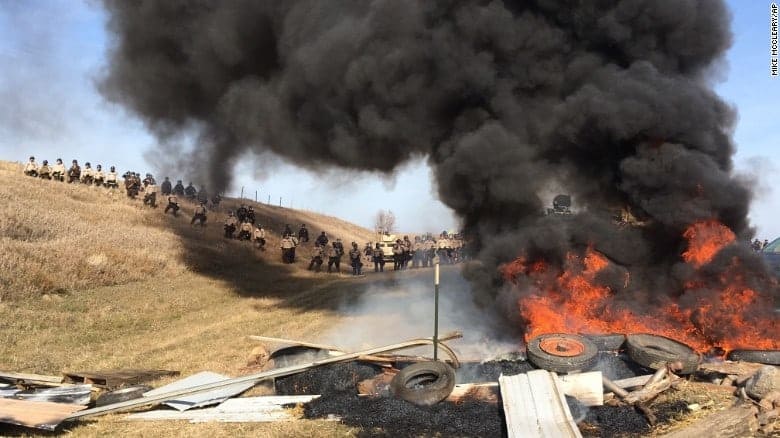
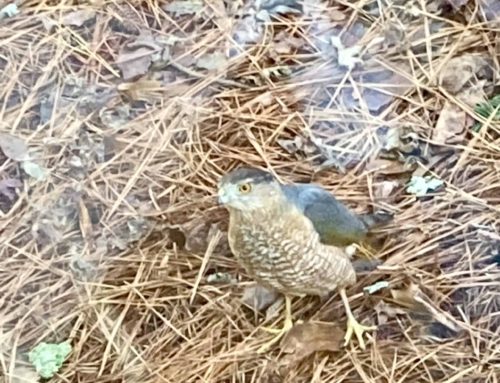
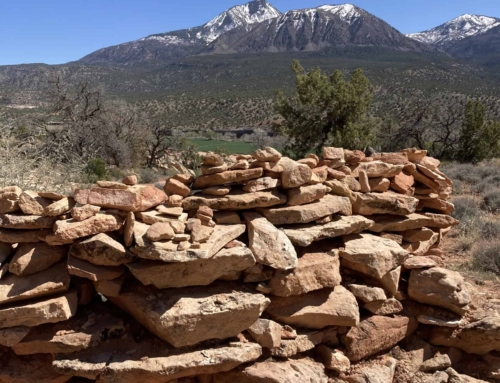
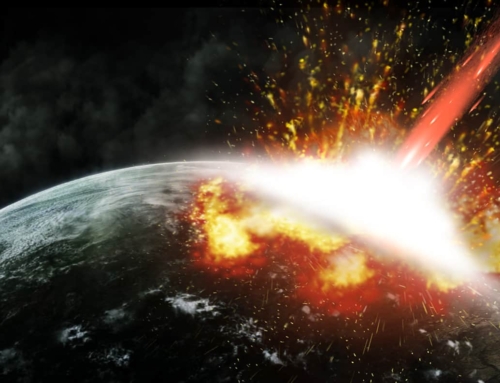
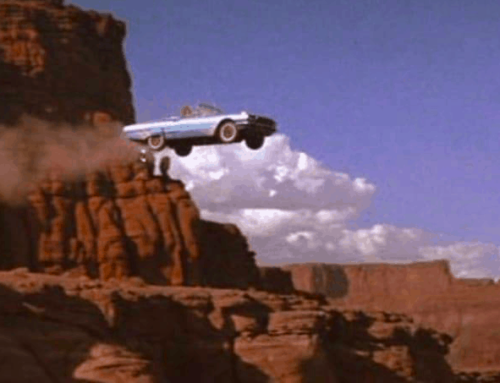
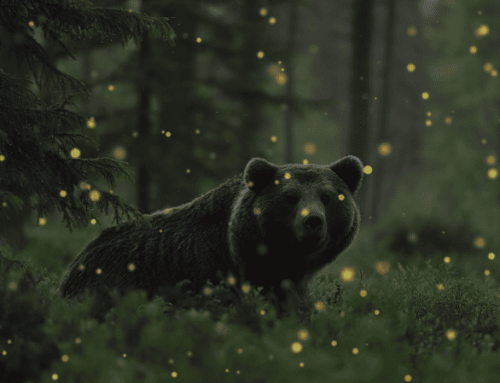
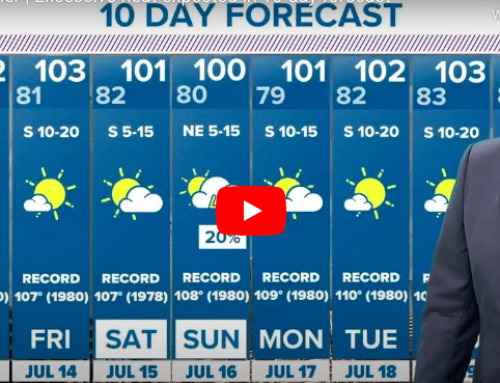
Leave A Comment